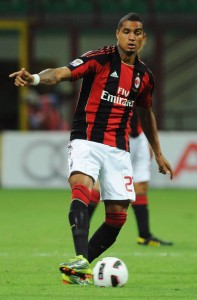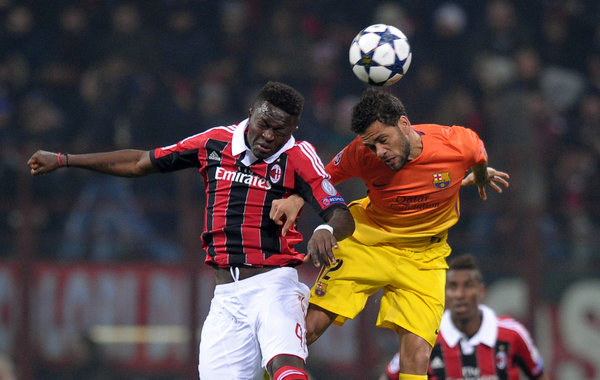LONDON, UK — So how does a faded A.C. Milan, whose owner sold the club’s best assets last summer and gave the coach journeymen players instead, put Barcelona on the brink of elimination from the Champions League?
Two Ghanaians, Kevin-Prince Boateng and Sulley Muntari, struck fine opportunist goals. No Barcelona player — not Lionel Messi, Xavi Hernández, Andrés Iniesta or any of them — reached their level or was allowed to in A.C. Milan’s San Siro stadium on Wednesday.
When it was over, with the Italian squad in shock at leading 2-0 against the best club side on earth, A.C. Milan Coach Massimo Allegri lauded his employer, the team president Silvio Berlusconi.
Some diplomat is Allegri.
“We dedicate this to the president,” he said, “because he has given me a team I can work with.”
That is a team divested of its previously talismanic striker, Zlatan Ibrahimovic, and its top defender, Thiago Silva, who both joined Paris Saint-Germain before the season got under way.
At the same time, A.C. Milan removed a lot of big names from its payroll: Gennaro Gattuso, Clarence Seedorf, Pippo Inzaghi and Alessandro Nesta. Maybe that is the key to what Allegri was talking about, a clearing out of aging players, and, in Ibrahimovic’s case, of a self-centered leader, that allowed the coach to restructure the team to his own ideals.
Allegri had claimed, before the Wednesday match, that he frequently discusses tactics with the owner. And Berlusconi, taking his case through the media as ever, had given the coach the solution to beating Barcelona: Mark Lionel Messi tightly at all times, and don’t give Barcelona’s finest individual an inch of freedom.
Messi, it is true, had one of his very rare off nights. He seldom got into the A.C. Milan penalty box, and he never got in a shot, much less threaten to score a goal.
For that, and for the suppression of Xavi’s creative passing and for the minimization of Iniesta’s great dribbling skills, we must thank the president? For unleashing good, strong, hungry talents, like Stephan El Shaarawy, who was tireless in his running, and even an older one, Giampaolo Pazzini, who was brave and smart as he stood in for Mario Balotelli, who cannot suit up for A.C. Milan because he previously played in the tournament for Manchester City?
Should we thank Berlusconi for the team discipline that was led by Massimo Ambrosini and followed through by every man in A.C. Milan’s black and red striped shirts?
“We played in a certain way tonight, but against Barcelona you have to play like that,” said Ambrosini, the captain. “Maybe it’s not aesthetically beautiful, it’s not very nice to watch,” he added. “They force you to play like that, and history teaches us that Barcelona were eliminated in this competition only by teams who faced them in a certain way.”
He spoke of the Italian way, the solidarity of keeping the defense and the midfield so tightly together that there is no space for Barça’s renowned passing and moving to go anywhere.
Ambrosini also spoke of the luck that contributed to the first goal, and then the “very nice” second one.
The luck was misjudged by Barcelona players, and by most of the audience. It had seemed, after an A.C. Milan free kick ricocheted first off the Barcelona defender Jordi Alba and then off A.C. Milan’s Cristian Zapata, that the ball struck Zapata’s hand.
In fact, as seen in slow-motion replay, Zapata had taken the full force of the shot in his face. From there, it fell to Boateng, who drove it handsomely into the net.
 In shock and losing rhythm, Barcelona could get little help from its bench. It has been said, even from within its camp, that Barcelona has such an intelligent group of players that they can think for and manage themselves, regardless whether their coach, Tito Vilanova, is in New York for cancer treatment.
In shock and losing rhythm, Barcelona could get little help from its bench. It has been said, even from within its camp, that Barcelona has such an intelligent group of players that they can think for and manage themselves, regardless whether their coach, Tito Vilanova, is in New York for cancer treatment.
Wednesday, perhaps, was when the coach might have made adjustments to help his men out of an impasse.
But, in pursuing the equalizer, Barcelona left itself short in defense and exposed to the crucial second goal. A.C. Milan hit the Catalans with the perfect counterattack.
M’Baye Niang had come on with the freshness of youth to put pressure on Barcelona’s Carles Puyol on the right. Having won the ball, Niang fluently passed it to El Shaarawy, whose own touch was brief but sublime.
The Italian simply helped the ball on its way, with the deftest of flicks, into the path of Muntari.
And then the Ghanaian — who had spent some time at a financially doomed English club, Portsmouth, and spent months this season battling a knee injury — applied the final hammer blow to Barça. Muntari met the ball with a volley, with his left foot almost as high as his knee, and struck it inside the far post at a ferocious, but sweetly timed, speed.
It was all over, bar the talking.
Barcelona’s players admitted they thought they had control of the match, and they can blame neither the field conditions nor the Scottish referee. And they acknowledge that they are staring at elimination from a tournament they were favorite to win (again). Barça requires three goals, and since its defense is never airtight, possibly four, to come through in the second leg on March 12.
And A.C. Milan? “We played as a team, and we listened to our coach,” concluded Muntari. “We were very disciplined. We managed to close every angle Barcelona had, so they couldn’t get through.”
He paused, smiled, and added: “Barcelona is the top club in the world. If you don’t concentrate and you don’t keep your discipline, they’re going to harm you. They have amazing players.”
Amazing players who now have to stage an amazing comeback.










